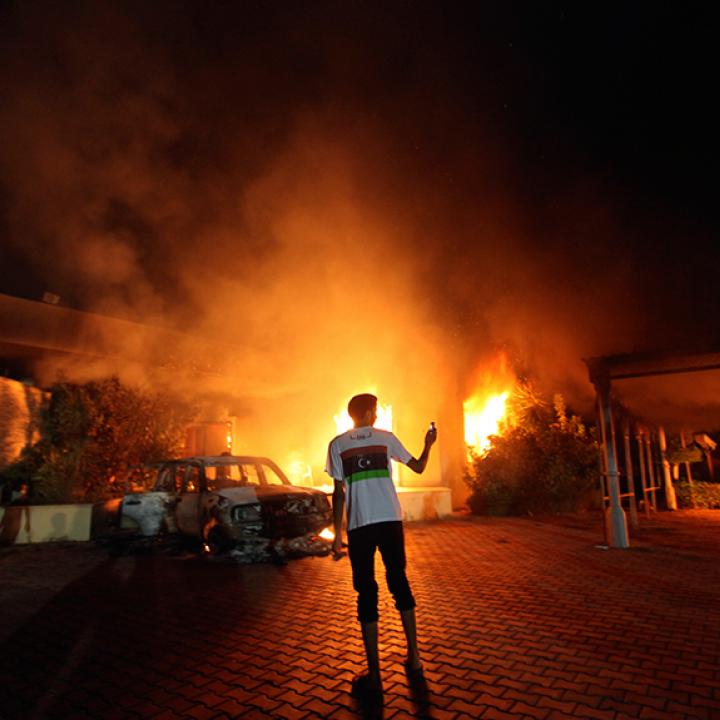
- Policy Analysis
- Articles & Op-Eds
It's Not Just the Sparks That Caused This Fire in the Middle East

The United States must avoid the temptation of misapprehending the current spurt of violence in the region or rashly disengaging in frustration over longstanding problems.
Precisely eleven years after the attacks of Sept. 11, 2001, the question of U.S. relations with Islamic countries and communities is once again at the top of the foreign policy agenda. As violent anti-American protests rage around the world, the Obama administration has focused on safeguarding U.S. citizens and installations on one hand, and seeking to dampen the fury of the protests on the other by pointing out that the U.S. government had nothing to do with the anti-Islamic video that ignited this burst of anger.
While this immediate focus on quelling the crisis is prudent, the U.S. response cannot stop there. While the video in question may have catalyzed these protests, it cannot accurately be described as the cause of them. In any event, any effort to quash future provocations of this sort is bound to be futile -- given the ease by which such media can now be produced and distributed -- as well as profoundly contrary to the American belief in the right to free expression.
The current unrest is not in fact a result of a single offensive video, but is rather a continuation and outgrowth of the Arab uprisings of 2011. Those revolutions were the result of deep-seated political and economic grievances that had been decades in the making: the absence of economic prosperity or the hope of individual advancement, paired with the inability to do anything about it as a result of the simultaneous absence of political rights.
But while the Arab uprisings resulted from those grievances, they did not by any means resolve them. Indeed, economies like Egypt's and Libya's are worse off now than they were at the beginning of 2011, as unrest and political uncertainty have driven away tourism and investment and politicians have as frequently sought to settle old scores instead of taking their countries forward. Political participation has increased, but it has not brought results sufficient to meet the (unrealistic) expectations of the people in these countries.
In such circumstances, it is not unusual for people to look for others to blame. As much as the recent anti-American protests and attacks on U.S. embassies have conjured an image of a U.S.-Islamic conflict, the United States is in fact just one of many parties upon whom blame for the Middle East's woes has been cast. The former regimes, religious minorities, wealthy businessmen, Israel, and liberals are among those who have been targeted in these Arab uprisings.
Just as there is no shortage of parties to blame, there have been an abundance of parties both within and without these countries ready to stoke these hatreds to advance their own agendas. Radical Islamists have perhaps been the most pervasive and vocal of these, but certainly not the only ones. In many Middle Eastern states, secular politicians have been as vocally anti-American as their Islamist counterparts. Whatever their ideology, the angry voices have drowned out the introspective ones, and those preaching simple fixes have too often prevailed over those offering sensible albeit difficult paths forward. In highly-charged environments where security and political institutions are either absent or non-functioning, it is a small step from rhetorical attacks on such perceived foes to physical attacks.
At such a pivotal moment, it is important that we correctly understand what is happening and why, and mount the appropriate policy response. We must in particular avoid the temptation of misapprehending the current spurt of violence as the harbinger of some sort of epic civilization-level conflict between the West and Islam, or the urge to disengage with the Middle East in frustration over the persistence of anti-Americanism and chaos there. The Middle East remains a region which is vital to U.S. interests, and we cannot afford either to ignore it or to act in a rash or naive manner there.
Since the beginning of the Arab uprisings, the Obama administration has adopted a passive, hesitant approach to events, conveying the sense that America is increasingly disengaged, indifferent, or both when it comes to the Middle East. This can be seen in the disconnect between rhetoric and action on Syria, diffidence in dealing with the Muslim Brotherhood in Egypt, "leading from behind" in Libya, and even in the talk of a "pivot" to Asia in our foreign policy. The result has been a diminution rather than an enhancement in both U.S. influence and -- despite strenuous efforts to avoid disputes with new governments in the region -- our popularity.
Going forward, the United States should not lose our hope for a positive future in the Middle East or confidence in our own ability to shape outcomes there. However, we should be clear-eyed about the challenges that we face and the long timetable which lies before us to accomplish what we set out to achieve. Foreign policy has three fundamental objectives -- to promote American security and prosperity and to advance U.S. values. This should be the starting point for successful policy in the region -- firmly and unapologetically advocate our interests, help governments to reform politically and economically, and support and work with parties within and without the region who share our interests and values.
Any spark can start a fire, but a sustained conflagration requires fuel and oxygen to sustain itself. There is little U.S. policymakers can do to prevent future sparks of the sort that triggered the violence convulsing the Middle East today. But through a clear understanding of the region's challenges and a principled and realistic response to them, we and our allies can hope to prevent them from becoming infernos which engulf our interests and those of the region's citizens.
Michael Singh is managing director of The Washington Institute.
Foreign Policy


